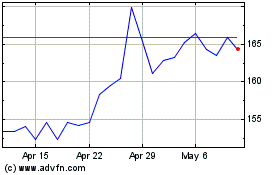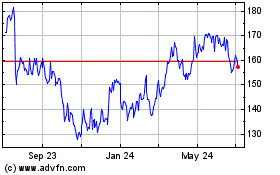By James R. Hagerty
Wayne Huizenga, a college dropout, got his start in business
hauling trash. His energy and ambition made him a driving force in
the growth of three major companies: Waste Management Inc.,
Blockbuster Entertainment Corp. and AutoNation Inc. He also owned
major league football, baseball and hockey teams.
Mr. Huizenga (pronounced HI-zin-guh) died Thursday, his office
said. He was 80 and had cancer.
A restless entrepreneur, he favored service businesses with
regular streams of income. He found parallels between Blockbuster
and the Miami Dolphins: one involved renting videos, the other
stadium seats. Rather than creating new businesses, he sought
better ways to run established ones.
"We're certainly not smarter than the next guy," Mr. Huizenga
told Gail DeGeorge, author of a 1996 book about his career, but "we
work harder, and when we focus in on something we are consumed by
it."
Though he loved flying around the country to scout acquisitions
or inspect his operations, he wasn't much interested in running a
business long-term. "I'd rather build a company than manage one,"
he told The Wall Street Journal in 1994.
Harry Wayne Huizenga, known as Wayne, was born Dec. 29, 1937, in
Evergreen Park, Ill. His grandfather Harm Huizenga, a Dutch
immigrant, had created a garbage-hauling business in Chicago. Wayne
Huizenga's father was a carpenter and home builder, and his mother
helped decorate the homes.
In 1957, Mr. Huizenga enrolled at Calvin College in Grand
Rapids, Mich., where he had a pet alligator, which died after being
given Scotch whisky at a student party, according to Ms. DeGeorge's
book, "The Making of a Blockbuster."
He dropped out of college to join the Army Reserve, then moved
to Florida and found a job managing a small garbage-hauling
company. Within a few years, he bought a used garbage truck,
started his own trash-hauling business and began buying rivals. By
1968, he had 40 trucks and a large share of the hauling contracts
in fast-growing Broward County.
He insisted on keeping the garbage trucks clean and
well-painted. Some sported slogans such as "This Truck Has Bad
Breath" and "We Cater Weddings."
Meanwhile, Dean Buntrock, a South Dakota native who had married
a cousin of Mr. Huizenga, began running the Chicago-area garbage
business started by Mr. Huizenga's grandfather. Mr. Buntrock
persuaded Mr. Huizenga to combine the Florida and Chicago
businesses into one publicly owned company, which became Waste
Management. Mr. Huizenga then raced around the country making
acquisitions to build a national business.
Mr. Huizenga's first marriage failed, partly because he was so
wedded to business. "I've never understood how someone could
separate their business from their personal life," he once said. In
1972, he married Marti Goldsby, who had done billing and clerical
work for one of his early trash companies. She died 14 months
ago.
By the late 1970s, Mr. Huizenga was tired of commuting between
his home in Fort Lauderdale and the Chicago headquarters of Waste
Management. He also disliked being nominally subordinate to Mr.
Buntrock, who was chief executive while Mr. Huizenga was
president.
He left the company in 1984 and spent some time fishing for
marlins, racing cars and lounging on his 91-foot yacht, the Sun
Dream. Soon, he was buying companies again, including suppliers of
portable toilets and water bottles for home coolers.
A friend, John Melk, owned a Blockbuster video store near
Chicago and encouraged Mr. Huizenga to visit it. Mr. Huizenga
didn't own a video player and wasn't interested in movies, but when
he visited the store in early 1987, he was impressed. Mr. Huizenga
and partners began investing in Blockbuster and gained control for
about $18 million. Then they rushed to acquire other video outlets
and create a national chain with bright, clean stores that were
larger than those of most rivals and shunned pornographic videos to
preserve a family image.
The company went public, and Wall Street loved the rapid growth,
but some analysts warned that the video boom eventually would peter
out as technology created better ways to deliver entertainment
electronically. Blockbuster diversified by investing in
recorded-music stores and movie production.
In 1994, Mr. Huizenga sold Blockbuster to Viacom Inc., headed by
Sumner Redstone, for $8.4 billion of stock. Soon afterward, the
Blockbuster business began to deteriorate. One problem was that
retail prices for videos fell, making it more tempting for people
to buy than rent. Then came the gradual shift to buying movies over
the internet.
Dish Network Corp. bought the Blockbuster chain out of
bankruptcy in 2011, but within two years was closing it down.
Mr. Huizenga moved on in the mid-1990s to invest in trash
collection again via his Republic Industries Inc. He also founded
AutoNation in an attempt to create the Home Depot of car retailing.
AutoNation's early performance was rocky, and in 1999 it announced
the closure of some of its megastores. Mr. Huizenga gave up his
managerial role.
He also was a co-founder of Extended Stay America Inc., a
lodging chain.
Unglamorous businesses still appealed to him. In 2004, Mr.
Huizenga and his longtime business partner, Steven Berrard, bought
control of Swisher Hygiene Inc., a maker of restroom sanitation
products, including the odor-fighting pucks found in urinals.
Mr. Huizenga invested in major league sports in the 1990s and at
one point owned the Marlins (baseball), Dolphins (football) and
Panthers (hockey). He hoped to treat them all like businesses.
Worried about the details of customer service, he looked for
containers that would help fans avoid spilling popcorn. Eventually,
though, it became clear that sports weren't like other businesses.
Every decision on talent was subject to endless second-guessing
from the public, and moves that strengthened teams didn't
necessarily bolster profits.
One regret, he told the South Florida Sun-Sentinel in 2009, was
selling or trading the Marlins' best baseball players a year after
they won the World Series in 1997. "We lost $34 million the year we
won the World Series," he said. "If I had to do it over again, I'd
say, 'OK, we'll go one more year, but I'm telling you right now, at
the end of this year, I'm out of here.' "
Mr. Huizenga also regretted that his hectic business life left
little time for his children. "Your kids grow up a lot quicker than
you think they do, and all of a sudden you look back, you haven't
spent the time with them," he said. He is survived by four children
and 11 grandchildren.
(END) Dow Jones Newswires
March 23, 2018 12:35 ET (16:35 GMT)
Copyright (c) 2018 Dow Jones & Company, Inc.
AutoNation (NYSE:AN)
Historical Stock Chart
From Mar 2024 to Apr 2024

AutoNation (NYSE:AN)
Historical Stock Chart
From Apr 2023 to Apr 2024
